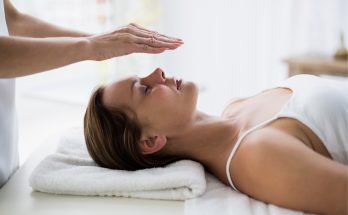Have you had your first colonoscopy yet? Doctors tell us we should start getting them at 50, but if you’re anything like me, just the thought of it made you shudder and immediately erase the possibility from your mind as soon as you left your doctor’s office (or shut off your Zoom, or hung up the phone).
Unfortunately, you are going to have to do it anyway. And unlike the five stages of grief, the path to this important but daunting cancer screening begins with acceptance. No matter what your first instinct, this is still something you have to do, and it’s for all the best reasons.
When I was in my 30s, my father told me that my aunt’s doctor had discovered a terrible problem she had because of a “routine colonoscopy.” I was familiar with each of those words separately, but together? As a phrase? It was a shock to me that a colonoscopy could be routine, which meant that one day I, too, would have to have one. I was still many years away from such a thing and remained in denial, like most people that age.
Then suddenly I blinked, and my doctor was telling me my time had come. Here’s why, and I’m stealing the stats from WebMD: “Colorectal cancer is the third most common cause of cancer-related death for both men and women. However, if it is caught early, colorectal cancer has a 90% survival rate.” My doctor added that this is the NUMBER ONE most effective way to prevent cancer. Make the leap to acceptance, my friend. If you’re at that age, and you want to live a lot longer, this is something you need to do.
Advice, from a newly inaugurated colonoscopy vet
Piece of advice #1: Get a personal recommendation. My GP gave me a generic number to call, but another doctor described someone as “worth getting a colonoscopy for,” so that’s who I chose. And she was right about him—the first thing he did when we met was to take a few steps back and remove his mask for just a few seconds, so I could see his face.
Piece of advice #2: Do NOT, I repeat, do NOT read everything on the internet and panic. Like the words “routine” and “colonoscopy,” “internet and “panic” will instantly bond in an impermeable way. If you make the mistake of doing this anyway, at least bring all the “facts” you’ve learned to your doctor, who will dispel them with good cheer. The worst thing I read was that you’d still be evacuating your insides on the way to your appointment and would need to wear a diaper. I don’t know what kind of prep they used to give people, but my doctor assured me that by the morning of my procedure, I would not have anything left inside. Phew. Awkward drugstore trip averted!
Once I’d talked to my new doctor friend, I learned that what everyone else says is true: The procedure itself is a non-issue. The challenge is the prep. I will not lie to you, the prep is unpleasant. I opted against the low-volume version, as my doctor said that low volume means concentrated, both in its content and in its effects on the body. He also had information about how to make the prep easier on your system, which involved altering your diet for a few days before. I was disappointed that I’d have to give up my lunch salad for a few days, but I was all for reducing the drama of prep night.
Prep night
Here’s the most important thing to know, based on my one experience: The instructions say the solution starts to work in about an hour, but I’d suggest you get yourself to the bathroom after about a half hour. Keep the drink with you—my instructions, which vary, said to drink a full glass every ten minutes or so—and just seat yourself.
Here’s why, and then we shall speak no more of this: You MIGHT think you’re farting, and then find out that was more than you’d bargained for. So bring a book, something to watch TV on or play games with, and settle in. You’re going to be there for a while.
The final word on prep from me is that it’s not fun, but it’s not the nightmare I’d been led to believe. It’s physically uncomfortable, and boy did I get tired of sitting on the toilet, but you don’t have stomach cramps or get all sweaty or suffer from any other symptoms that usually accompany an extended period of time in the bathroom. But I’m going to be blunt about why you don’t leave: Your mind-body connection disappears. You will be pooping without any of the warning signs that tell a non-gross-prep-drinker it’s time to go. It just… happens. I’ve never been less in touch with my own body. And yes, the drink is gross, but mildly so. Mine was pineapple, and only started getting vile by the fourth glass. The flavor was mild and was the least of my tribulations.
Pro tip: Get a coach! My friend Laura was texting me through the process. She had great advice and was very soothing while this seemingly monstrous thing was happening, reminding me that I would feel normal again, sooner that I thought.
My doctor said not to drink ALL the liquid, but just keep going until it’s obvious that nothing else is coming out—when you’re pooping out liquid only—and then stop. Congratulations! You’ve made it through the worst part already.
Showtime!
The end of this, the colonoscopy itself, is anticlimactic if ever a thing was. There’s no terrifying moment of bare-assed vulnerability, no glimpses of the camera itself to scare you with its… length. You fall asleep, you wake up, you go home, and you eat something delicious, albeit slowly, as your body ramps back up.And then it’s all over, for years… unless you’re me! When I woke up, the doctor told me that I have an “unusually long and winding colon”—cue up the Beatles song, to which I’ve already written new lyrics—and that I need a SECOND procedure so they can see the part of my colon that was unreachable. I’m one in a thousand, he told me, and for the first time in my life, I really did NOT want to feel so special. I hear the prep is similar, so at least I can read this back and then take my own advice. Not that I’m looking forward to it or anything, but I’m not terrified anymore.



